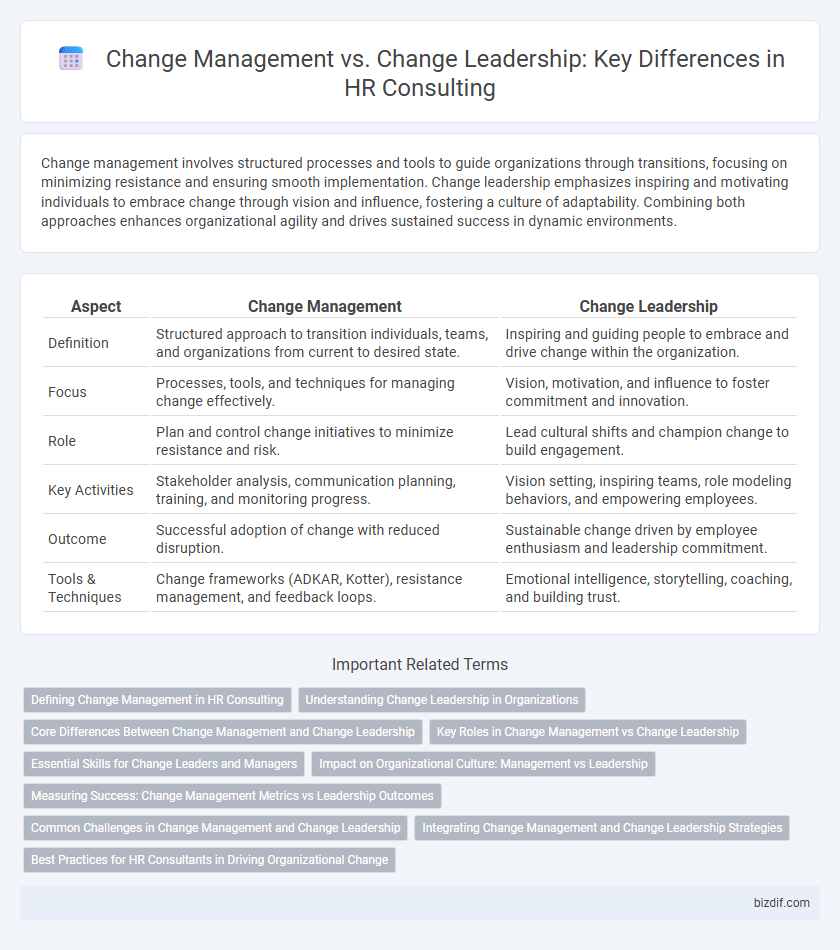Change management involves structured processes and tools to guide organizations through transitions, focusing on minimizing resistance and ensuring smooth implementation. Change leadership emphasizes inspiring and motivating individuals to embrace change through vision and influence, fostering a culture of adaptability. Combining both approaches enhances organizational agility and drives sustained success in dynamic environments.
Table of Comparison
| Aspect | Change Management | Change Leadership |
|---|---|---|
| Definition | Structured approach to transition individuals, teams, and organizations from current to desired state. | Inspiring and guiding people to embrace and drive change within the organization. |
| Focus | Processes, tools, and techniques for managing change effectively. | Vision, motivation, and influence to foster commitment and innovation. |
| Role | Plan and control change initiatives to minimize resistance and risk. | Lead cultural shifts and champion change to build engagement. |
| Key Activities | Stakeholder analysis, communication planning, training, and monitoring progress. | Vision setting, inspiring teams, role modeling behaviors, and empowering employees. |
| Outcome | Successful adoption of change with reduced disruption. | Sustainable change driven by employee enthusiasm and leadership commitment. |
| Tools & Techniques | Change frameworks (ADKAR, Kotter), resistance management, and feedback loops. | Emotional intelligence, storytelling, coaching, and building trust. |
Defining Change Management in HR Consulting
Change Management in HR Consulting involves structured approaches to transitioning individuals, teams, and organizations from current to desired states, minimizing resistance and maximizing engagement. This process includes communication plans, training programs, and stakeholder analysis to ensure smooth adoption of organizational changes. Effective Change Management aligns HR strategies with business goals, fostering a resilient workforce and sustainable transformation.
Understanding Change Leadership in Organizations
Change Leadership in organizations emphasizes inspiring and guiding employees through transformation by fostering a shared vision and emotional commitment. Unlike Change Management, which focuses on processes and systems, Change Leadership centers on motivating individuals to embrace change and drive innovation. Effective Change Leadership enhances organizational agility and sustains competitive advantage by aligning leadership behaviors with strategic goals.
Core Differences Between Change Management and Change Leadership
Change management emphasizes structured processes and tools to guide organizational transitions, focusing on minimizing disruption and maintaining control. Change leadership centers on inspiring and motivating individuals, fostering a vision that drives commitment and cultural shifts. The core difference lies in management's focus on systems and risk mitigation, while leadership prioritizes influence, engagement, and transformation.
Key Roles in Change Management vs Change Leadership
Key roles in change management primarily involve project managers, communication specialists, and HR professionals who focus on planning, executing, and monitoring change initiatives. Change leadership emphasizes the role of visionary leaders and executives who inspire, motivate, and drive cultural transformation within the organization. While change management ensures structured implementation, change leadership fosters employee engagement and sustained commitment throughout the change process.
Essential Skills for Change Leaders and Managers
Effective change leaders demonstrate emotional intelligence, strategic vision, and strong communication skills to inspire and guide teams through transitions. Change managers focus on project management, process optimization, and risk mitigation to ensure smooth implementation of change initiatives. Mastering both leadership and management skills fosters agility and resilience within organizations during change transformations.
Impact on Organizational Culture: Management vs Leadership
Change management primarily focuses on structured processes that minimize disruptions during transitions, ensuring employees adhere to new systems and policies, which can preserve existing organizational culture but may limit cultural evolution. Change leadership drives transformative vision and inspires employee engagement, fostering a culture of innovation, adaptability, and proactive collaboration throughout the organization. Organizations that emphasize change leadership over management typically experience deeper cultural shifts that support long-term agility and competitive advantage.
Measuring Success: Change Management Metrics vs Leadership Outcomes
Change management success is often measured through metrics such as employee adoption rates, project timeline adherence, and cost efficiency, reflecting how well changes are implemented. Change leadership outcomes emphasize long-term impact, including cultural transformation, employee engagement, and innovation capacity, which indicate sustainable organizational growth. HR consulting integrates these approaches by combining quantitative change management metrics with qualitative leadership outcomes to provide a comprehensive assessment of change initiatives.
Common Challenges in Change Management and Change Leadership
Common challenges in change management and change leadership include resistance from employees, lack of clear communication, and insufficient stakeholder engagement. Change management often struggles with rigid processes and limited flexibility, while change leadership faces difficulties in inspiring and motivating teams amid uncertainty. Both disciplines require strategic alignment and adaptive skills to navigate organizational transformation successfully.
Integrating Change Management and Change Leadership Strategies
Integrating change management and change leadership strategies enhances organizational agility by combining structured processes with visionary guidance. Change management focuses on systematic approaches like communication plans, stakeholder engagement, and training, while change leadership inspires commitment through vision and motivation. Leveraging both frameworks drives sustainable transformation, improves employee adoption, and accelerates business outcomes in dynamic environments.
Best Practices for HR Consultants in Driving Organizational Change
Effective HR consultants differentiate Change Management from Change Leadership by emphasizing strategic vision and employee engagement. Best practices include fostering transparent communication, empowering middle managers as change champions, and embedding continuous feedback loops to adapt initiatives swiftly. Developing leadership capabilities alongside structured change frameworks ensures sustainable organizational transformation and maximizes employee buy-in.
Change Management vs Change Leadership Infographic

 bizdif.com
bizdif.com